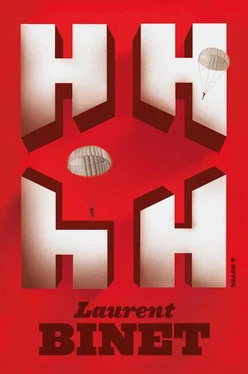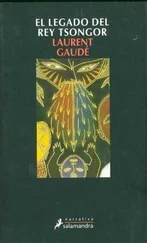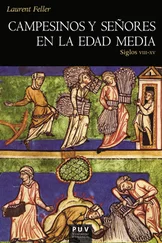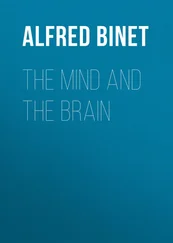On October 3 in London, the free Czechoslovak press formally records a change of politics in Prague with this headline:
“Mass Murders in the Protectorate.”
One of Heydrich’s men was already running things there two years before. In 1939, Eichmann—having done such a good job in Austria—found himself in charge of the central office for Jewish emigration in Prague before being promoted to head of Jewish affairs at the RSHA in Berlin. Today, he returns to Prague at his master’s summons. But in two years things have really changed. From now on, when Heydrich organizes a conference, it is no longer to discuss “emigration” but “the Final Solution of the Jewish question” in the Protectorate. These are the facts: 88,000 Jews live in the Protectorate, of whom 48,000 are in Prague, 10,000 in Brno, and 10,000 in Ostrava. Heydrich decides that Terezín will be the ideal transportation camp. Eichmann takes notes. Transportation will be quick—two or three trains a day, with a thousand people on each train. Following the tried-and-tested method, each Jew will be allowed to take one piece of luggage (without padlock) containing up to fifty kilos of personal belongings. In order to simplify the Germans’ task, he should also carry enough food to last him between two and four weeks.
Newspaper and radio reports relay developments in the Protectorate to London. Sergeant Jan Kubiš listens as a parachutist friend tells him about the situation in his homeland. Murders, murders, murders. What else? Since Heydrich’s arrival, every day is a day of mourning. People are deported, tortured, hanged. What monstrous new details have plunged Kubiš into this state of shock today? He shakes his head and, like a stuck record, repeats: “How is it possible? How is it possible?”
I went to Terezín once. I wanted to see the place where the poet Robert Desnos died. Coming from Auschwitz, and passing through Buchenwald, Flossenburg, and Flöha, he ended up—on May 8, 1945—at the liberated camp of Terezín. But during the long, exhausting death marches that preceded this, he caught the typhus that would kill him. He died on June 8, 1945—in death as he was in life: free—in the arms of two young Czech nurses, a man and a woman, who loved surrealism and admired his works. Another story I could write a whole book about: the two young nurses were called Josef and Alena…
Terezín—Theresienstadt in German—was “a fortified town built by the Empress of Austria to defend the Bohemian quarter from the grasp of the Prussian king Frederick II.” Which empress? I don’t know. I’m borrowing this sentence—because I like it—from Pierre Volmer, Desnos’s companion and the witness of his final days. Maria Theresa? Of course—Theresienstadt, the town of Theresa.
In November 1941, Heydrich turns the town into a ghetto—and the barracks into a concentration camp.
But this is not all there is to say about Terezín. Far from it.
Terezín was not like the other ghettos.
It was used as a transportation camp: the Jews there were waiting to be deported eastward, to Poland or the Baltic countries. The first convoy left for Riga on January 9, 1942: a thousand people, of whom 105 would survive. The second convoy, a week later, also went to Riga: a thousand people, 16 survivors. The third, in March: a thousand people, 7 survivors. The fourth: a thousand people, 3 survivors. There is nothing unusual in this dreadful numerical progression toward 100 percent. It is just another sign of the Germans’ famous efficiency.
But while the deportations continue, Terezín has to function as a Propagandalager —a showcase ghetto for the eyes of foreign observers. The ghetto’s inhabitants must put on a good show during visits from the International Red Cross.
At Wannsee, Heydrich announces that German Jews decorated in the First World War, German Jews over the age of sixty-five, and certain famous Jews—the Prominenten , too famous to disappear overnight without a trace—should be kept at Terezín, in decent conditions. This is done out of consideration for German public opinion, somewhat aghast by 1942 at the politics of the monster it has nurtured since 1933.
In order for Terezín to work as an alibi, the Jews must appear well treated. This is why the Nazis allow them to have a relatively well developed cultural life, with art and theater encouraged—under the vigilant control of the SS, which asks everyone to wear their most winning smiles. And it works. The Red Cross representatives, impressed by their visits, report very positively on the ghetto, its culture, and the treatment of prisoners. Of the 140,000 Jews who will live in Terezín during the war, only 17,000 will survive. Kundera writes of them:
They were under no illusions: they were living in death’s antechamber; their cultural life was exhibited by Nazi propaganda as an alibi; but should that be a reason to refuse freedom, however precarious and fraudulent? Their response was utterly clear: their creations, their art shows, their concerts, their loves, the whole array of their lives were incomparably more important than their jailers’ macabre theatrics. That was their wager.
In conclusion, he adds: “It should be ours, too.”
You don’t need to be head of the secret services to see that President Beneš is extremely worried. London constantly evaluates the contribution to the war effort made by the various underground movements in the occupied countries. And while France—thanks to Operation Barbarossa—is benefiting from the input of Communist groups, the Czech Resistance is practically nonexistent. Since Heydrich took control, the Czech underground movements have fallen one by one, and the few that remain have largely been infiltrated by the Gestapo. This ineffectiveness puts Beneš in a very uncomfortable position: as it stands, even if the Allies are victorious, Britain will not want to listen to a discussion about revoking the Munich Agreement. This means that, even in victory, Czechoslovakia would be restored only to its September 1938 frontiers, with the Sudetenland amputated, leaving it far from its original territorial integrity.
Something must be done. Colonel Moravec listens as his president moans bitterly. This humiliating insistence with which the British compare Czech apathy with the patriotism of the French, the Russians, even the Yugoslavs! It can’t go on.
But what to do? There’s no point ordering the internal Resistance to intensify its activities, given its disordered state. So the solution lies here, in Britain. Beneš’s eyes must have shone, and I imagine his fist banging the table as he explained to Moravec what he was thinking. A spectacular attack on the Nazis—an assassination prepared in the greatest secrecy by his parachute commandos.
Moravec understands Beneš’s reasoning. The Resistance is dying, so reinforcements must be sent from abroad—armed men, well trained and motivated, who will accomplish a mission that sends out shock waves, nationally and internationally. It must impress the Allies by showing them that Czechoslovakia cannot be counted out, and at the same time it must stimulate Czech patriotism so that the Resistance can rise once again from the ashes. I say “Czech patriotism,” but I’m pretty sure that Beneš said “Czechoslovak.” I’m also pretty sure that he was the one who insisted that Moravec choose a Czech and a Slovak to carry out the operation. Two men to symbolize the indivisible unity of the two peoples.
But we’re getting ahead of ourselves. First they must decide on a target. Moravec thinks straightaway of his namesake—Emanuel Moravec, the most collaborationist minister in the Protectorate, a sort of Czech Quisling. But his resonance is too local—no one beyond the country’s borders would care. Karl Hermann Frank is better known: his ferocity and his hatred of the Czechs is legendary—and besides, he’s a German, and a member of the SS. He could make a good target. Then again, if you’re going to choose a German, and a member of the SS…
Читать дальше












